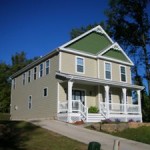 Recently, St. Louis green builder Matt Belcher cautioned Congress on the danger of one-size-fits-all proposals for home construction. Belcher’s argument is that policies that encourage rather than mandate energy savings are the most meaningful at stimulating greater demand for energy-efficient homes.
Recently, St. Louis green builder Matt Belcher cautioned Congress on the danger of one-size-fits-all proposals for home construction. Belcher’s argument is that policies that encourage rather than mandate energy savings are the most meaningful at stimulating greater demand for energy-efficient homes.
“The ability of aggressive building code mandates to achieve massive energy and greenhouse gas emissions savings is incredibly limited. The wide-ranging geographic differences in state and local climates create specific building needs, making national benchmarks almost untenable,” he said.
Further, “significant increases in costs for efficiency upgrades and the additional increase in home price to accommodate them has the potential to harm the part of the market with the least flexibility to react to price constraints: the marginal first-time home buyer,” Belcher said. “NAHB does not support the assertion that a broad public policy objective should be achieved on the backs of a relatively narrow segment of the market with limited resources.”
And even when a home is built to be more energy efficient, it does not translate into automatic energy savings. “Almost half of the energy consumed in a home is the result of the lighting, refrigeration, laundry, cooking, and electronics use by the residents,” Belcher pointed out. “The disconnect between [building] envelope improvements – which are primarily the responsibility of the builder, and resident behavior – over which a builder has no control, is one of the major barriers to achieving greater improvements in residential energy efficiency in new homes.”
“It is false to assume that just requiring states or local governments to adopt an arbitrary above-code compliance target for all new construction is going to translate into improved enforcement . . or achieve the energy savings goals envisioned,” Belcher told Congress. “If resources, or infrastructure, to enforce the code are not available, then the savings assumed will never materialize.”
Belcher also asked Congress to extend the New Energy Efficient Home Credit, which was enacted in 2005 and expires at the end of the year. Department of Energy research shows that residential buildings consume 21.9% of the nation’s energy and produce 21% of its greenhouse gas emissions. However, Belcher pointed out, mandating that all new homes must achieve significant above-code performance will not produce the greatest energy savings because new homes are a small of the problem. Solutions to address all 21% – and include existing homes -demands greater focus.
Belcher also explained how the NAHB National Green Building Program can move the market. “The dynamic ways that the green building movement is rapidly changing residential construction is only one example of a broader, market-determined push for greater efficiency. In the midst of the worst housing downturn since World War II, builders continue to see growth in demand for green and energy efficient homes, as well as increased requests for efficiency upgrades in the 128 million existing homes, comprising the bulk of the nation’s residential energy consumption,” he said.